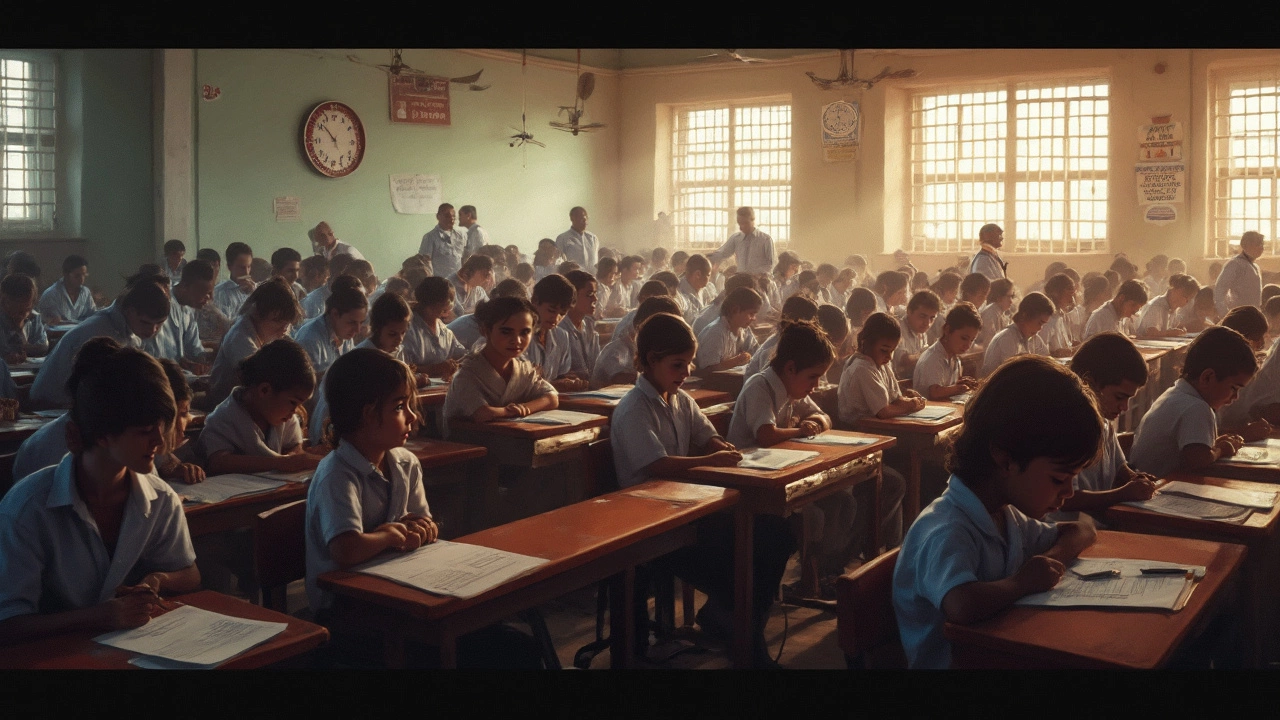
Ever stare at a test prep book so thick it could be used for weightlifting? Some licenses make even the best students sweat bullets. When people talk about brutal exams, they're not exaggerating. We're talking about licenses so tricky that even experts fail multiple times before getting through—or give up entirely.
If you dream about a job with real social status (or insane responsibility), you've got to ask yourself: which licenses are actually the hardest to get, and why? How do people prep for them, and where do most candidates trip up? It's not always about IQ. It's about persistence, strategy, and honestly, a little bit of pain tolerance.
In this deep dive, you'll see which certifications and licenses have the lowest pass rates, why some tests are designed to stump you, and what it takes to beat the odds. Expect no-nonsense facts, wild stories, and a few tricks that could actually make a difference if you're facing a monster exam soon. No motivational fluff—just the practical stuff people wish they knew.
- What Exactly Counts As a 'Hard' License?
- Legendary Contenders: The Licenses That Break People
- Why Are These Exams So Ridiculously Tough?
- Eye-Opening Examples: Pass Rates and Stories
- Insider Tips to Survive Impossible Exams
- Is It Worth the Pain? What You Really Get from These Licenses
What Exactly Counts As a 'Hard' License?
Plenty of people think their own test was the hardest ever, but there's a real way to sort what's tough from what's just annoying. The hardest licenses are the ones with low pass rates, insane preparation time, and super-high standards—like the Japanese bar exam, where pass rates have hovered near 20%, or the US CPA test, which sees more than half of first-timers walk away with a FAIL.
But stats aren't everything. Some licenses are considered brutal because you have to master huge piles of information—think medical or actuarial exams, which cover years of science or math. Others are hard because they're unpredictable, with curveball questions and strange formats that throw you off. Pilots going for their ATPL (Airline Transport Pilot License) have to pass a mix of theory, practical, and even psychological tests just to qualify. And anybody who's ever looked at the Indian UPSC Civil Services Exam knows it's a beast: thousands of pages to cover, multiple languages tested, plus essays, interviews, and even personality reviews.
So what really counts as the hardest license? Look for a combo of:
- Pass rates below 30% (or even lower, in some crazy cases)
- Prep time that eats up months—sometimes years
- More than one type of test (written, practical, oral, or even fitness)
- Failure means you have to wait a year—or longer—to try again
- National or global reputation for being a real career gatekeeper
It's not just about memorizing. It's about handling pressure and staying sharp even when you're running on empty. If someone tells you a test is hard but you can cram for it in a weekend, that's not a serious challenger for the hardest license title. The tests that make this list are infamous for a reason—and most people won't pass on the first try, no matter how smart they are.
Legendary Contenders: The Licenses That Break People
When people talk about brutal competitive exams, a few big names always come up. These licenses have become almost legendary—not because they’re desirable, but because they’re so hard to get, they chew up years of people’s lives. Some even push super-smart folks to change their career plans. That’s the level of intense we’re talking about.
Here are the licenses that have a reputation for being the hardest out there, thanks to their sky-high failure rates, insane study requirements, and tough selection processes:
- United States Medical Licensing Examination (USMLE): Three separate exams. Tons of medical students fail, especially Step 1. Prep can take a year or more. In 2023, roughly 5% of first-time US grads and 25% of international students didn’t pass Step 1 the first time.
- Chartered Financial Analyst (CFA): Widely considered the gold standard in finance. You need to pass three marathon exams, usually over 2-4 years. In 2023, Level I had a pass rate of just 39%.
- Bar Exam (USA): You have to pass to practice law. It chews up thousands of law grads every year. In tough states like California, the 2023 pass rate was around 48%.
- All India Civil Services Exam: This government exam is a monster. Only 0.2% of applicants become officers. Three stages, including crazy-detailed interviews. You need to know everything from politics to engineering.
- Japan’s National Medical Practitioners Examination: Roughly 10% of test-takers fail, despite years of heavy preparation. It’s mainly for local medical students but is known for its crazy details.
- Certified Public Accountant (CPA) – USA: The four-part test has average pass rates under 50% for each section. You need stamina to clear them all together in 18 months.
More proof that these licenses punish even the best:
| License/Exam | 2023 Pass Rate (%) | Time to Prepare (Months) |
|---|---|---|
| USMLE Step 1 | Domestic: 95 International: 75 | 12-18 |
| CFA Level I | 39 | 6-12 |
| California Bar | 48 | 6-9 |
| All India Civil Services | 0.2 | 12-36 |
| CPA (Each Part) | 48 (avg.) | 2-6 (per part) |
What makes these licenses so hard? They each have a combo of huge content (think entire college curriculums), brutal question styles, and time pressure. If you’re prepping for any of these, be ready for epic effort. But remember: if you pass, you’re joining a very exclusive club.
Why Are These Exams So Ridiculously Tough?
Let’s get real—these exams didn’t get legendary reputations by accident. Tough licenses act as an automatic filter, making extra sure only people with deep knowledge, steady nerves, and relentless grit can clear them. It’s not about making life unfair; it’s about protecting the public and keeping quality high in jobs where mistakes can be a disaster.
For example, in India’s UPSC Civil Services exam, less than 0.2% of applicants make it—mostly because there’s no way to wing it with last-minute cramming. In Japan, the National Bar Exam’s success rate hovers just below 30%, and in the U.S., only about 56% pass the California Bar on their first try. These careers deal with stuff like public safety, law, finances, or national security, where screw-ups can ruin lives.
Several things make these competitive exams legendary for their difficulty:
- Sheer Volume: Some tests cover everything from legal theory to current events, technical calculations, and mind-bending case studies. The CFA (Chartered Financial Analyst) exams, for example, demand mastery over thousands of pages of material.
- Trick Questions: Exam makers love to throw weird scenarios or curveballs, so rote memorization won’t cut it. You have to actually understand and apply knowledge on the fly. Pilot licenses like the FAA’s ATP test often use real-world emergencies, not just textbook questions.
- High-Stress Situations: Many licenses have practicals. Think of surgeons, airline captains, or firefighters—these tests simulate real pressure. You could ace written stuff and still fail a hands-on challenge.
- Limited Attempts: Some exams, like the Japanese National Bar, have a cap on the number of tries. Blow it too many times and you’re shut out for good.
Check out these numbers showing how brutal some pass rates can be:
| License/Exam | Country | Latest Pass Rate (%) |
|---|---|---|
| UPSC Civil Services | India | ~0.2 |
| California Bar Exam | USA | 56 (first-time) |
| CFA Level I | Global | 37 |
| National Judicial Exam | China | 11.7 |
So, why keep making them so hard? Simple—these jobs can wreck lives if done poorly. The crazy-difficult process means when you see that license hanging on a wall, you know real hustle stands behind it. Want to tackle the hardest license? Get ready for a marathon, not a sprint.

Eye-Opening Examples: Pass Rates and Stories
Ready for some wild stats? Let’s look at a few hardest license exams that people dread, and check out just how many get through on their first (or even second) try.
| License/Exam | Country | Recent Pass Rate |
|---|---|---|
| USMLE Step 1 (Medical License) | USA | 88% (first-time, 2024 data) |
| California Bar Exam | USA | 44% (July 2023) |
| Chartered Financial Analyst Level 1 | Global | 35% (May 2024) |
| UPSC Civil Services Exam | India | 0.2% (final stage, 2024 stats) |
| Japan National Medical Licensing Exam | Japan | 91% (2024) |
Don’t let high pass rates like Japan’s throw you off. In some places, folks train for years before even qualifying to sit the test, so those who actually make it there are top-notch to begin with. The real shockers are exams like India’s UPSC, where about one in five hundred people make it all the way through—imagine training for two years and still never making the cut.
The California Bar has its own horror stories. It’s not unusual to meet lawyers who sank two or three years into prep and failed multiple times. There’s even a term—“bar trauma”—for the stress. In the US, medical licensing takes three stages (plus crazy residency hours). Some people ace the first one and then crash and burn on the later steps.
CFA still has a reputation for basically eating your weekends for breakfast. Candidates often study over 300 hours for Level 1, only to stumble on the oddball questions nobody expects. If you have a friend who finally got the CFA letters, trust me, buy them a coffee—they’ve earned it.
These numbers aren’t just trivia. If you’re thinking about one of these careers, double check the commitment it really takes. Look for stories from real folks on Reddit, or check YouTube for actual day-in-the-life breakdowns. The people who make it all the way through usually do these things:
- Stick to an intense, consistent schedule—like 3-4 hours of study every single day, for months or even years.
- Do loads of practice questions and full-length mock exams, not just reading textbooks.
- Connect with others going through the same process online or in study groups to swap resources and pep talks.
Bottom line: Don’t just look at the pass rate, look at how deep the pool is to start with. These exams filter out even the best-prepared, leaving only the most stubborn and, yeah, sometimes a little lucky.
Insider Tips to Survive Impossible Exams
If you’re gearing up for the hardest license exams, you need way more than talent or good grades. People who pass the most brutal tests don’t just study hard—they work smart and use proven tactics. Here’s what actually gives you a fighting chance.
- Know Your Enemy: Grab old exam papers and the official syllabus early. For example, the Indian UPSC Civil Services exam releases past papers and marking patterns. The hardest questions often follow a pattern, so spotting repetition is a game-changer.
- Make a Ruthless Plan: Don’t wing it. Block out daily chunks for study, reviews, and timed practice. Guys prepping for the Japanese bar exam or USMLE say their schedules look like a military operation—seriously, every hour counts if you want to avoid last-minute panic.
- Practice in Real-Life Conditions: Use tools like mock exams, timers, and distraction-free spaces. Some CFA candidates even wear a suit during practice tests just to get used to the real thing. It sounds goofy, but it works.
- Don’t Forget Your Health: Exam prep marathons are brutal on your body. Sleep, decent meals, and short daily workouts like walks or push-ups matter a ton. People who tank their health usually see their performance drop off a cliff.
- Join a Tribe: Study groups, even virtual ones, make a big difference. You can divide up topics, quiz each other, or just vent with people who get it (and aren’t tired of hearing about your notes on acid-base balance).
- Strategize on Exam Day: Quick scan the entire paper before you scribble anything. Prioritize questions you know cold and bank easy points first, like finance pros do in their FINRA or CFA exams. Leave trickier stuff for round two to save time and avoid burnout.
Passing these exams is about grinding through frustration, not genius. People who pass on the first try usually have a process, bounce back after bad practice results, and aren’t afraid to adjust their approach if something’s not working. It's messy, but everyone who makes it says the pain is temporary—and the win is worth it.
Is It Worth the Pain? What You Really Get from These Licenses
After all the late nights, coffee overload, and stress, it's normal to wonder if passing a hardest license exam really pays off. The truth? In most cases, yes—but it's not always about the money or bragging rights.
Let's talk specifics. People who clear exams like the USMLE Step 3 for doctors, the California Bar for lawyers, or the CFA Level III for financial analysts get access to jobs most others can't even apply for. For example, passing the CFA exam unlocks top investment roles that often pay six figures right out the gate. Newly licensed California attorneys can bill high hourly rates, and board-certified surgeons or pilots in commercial airlines land some of the highest salaries in their industries. These licenses are literal keys to gates most people never open.
But the benefits go beyond paychecks. There's job security—licensed professionals like doctors, lawyers, or airline captains are rarely out of work, even in tough economies. Clients and employers trust the credential because they know how hard it is to earn. That trust often makes it easier to move up, take on leadership roles, or even switch cities or countries for work.
There's also a sense of community. When you pass a monster exam, you join a club of people who know what it took. That network isn't just for show—it leads to career growth, ongoing learning, and even friendships. And yes, having one of the toughest licenses can be a reliable confidence boost. You know you knocked down a challenge most folks walk away from.
While some people do end up changing careers, they almost never say the effort was wasted. The discipline, time management, and deep subject mastery you develop can transfer to any tough job after. Plus, if you ever decide to freelance, run your own firm, or teach, having one of these licenses gives you instant credibility.
So, is the pain worth it? If you want access to the best career doors, job security, a real professional community, and lifelong bragging rights—going for the toughest license in your field is one bet that'll probably pay off bigger than you expect.





